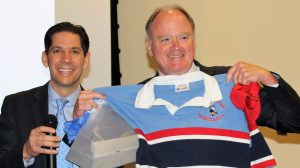
Andre Liebenberg (left), the university’s Robertson Chair of Insurance, presents an Ole Miss rugby jersey to Mike McGavick, CEO of the XL Group and keynote speaker for the annual UM Insurance Symposium. Submitted photo
OXFORD, Miss. – Industry changes, ethical dilemmas and cyber insurance were just a few of the topics tackled at the University of Mississippi’s 23rd annual Insurance Symposium.
The event, hosted by the School of Business Administration’s risk management and insurance program, was March 21-22 at The Inn at Ole Miss. It welcomed industry thought leaders from across the country.
Mike Chaney, the state’s insurance commissioner, offered welcoming remarks with praise for the event and for the RMI program, noting the program’s national recognition and student job placement. The commissioner also discussed his department’s longstanding commitment to addressing rural fires.
“The funding of the rural fire truck program is important to all Mississippians,” he said. “Without proper funding, pocketbooks of residents of Mississippi could be affected.”
Michael McGavick, CEO of the XL Group, delivered the keynote address on the important role that the insurance industry plays in society.
“Our job is to make people’s lives more resilient,” he said. Part of McGavick’s message focused on the problem of underinsurance in the U.S., pointing out that only 50 percent of residents in Manhattan were properly insured when Hurricane Sandy made landfall in 2012.
Lisa Davis, executive vice president of Sompo Global Risk Solutions and president of JIA Business, addressed challenges affecting insurance and the ever-evolving industry. She discussed the importance of being innovative and how organizations that tap into the motivations of human behavior and design their customer experience accordingly will be the next industry leaders.
“You can’t do today’s job with yesterday’s methods and be in business tomorrow,” Davis said.
Joel Wood, senior vice president for government affairs with the Council of Insurance Agents and Brokers, led a panel that discussed the implications for the insurance industry following the second year of Trump’s presidency.
“Eighty million Americans received their insurance through their employer,” Wood said. “The No. 1 tax expenditure in the U.S. tax code is the exclusion from health insurance. We have problems from the left and the right.”
Besides serving as a moderator and speaker during the symposium, Wood also was named the recipient of the RMI program’s annual Outstanding Supporter Award.
Daniel Healy, partner with Anderson Kill PC, discussed the rapidly evolving technological standards of cyber insurance. He also stressed the importance of understanding laws governing the industry and having a response team in place.
Some businesses can go 200 days or more before realizing their data has been compromised, Healy said.
“If you’re not following the rules of the industry, you’re at risk of getting sued,” he said.
Charles Westmoreland, a sales consultant with Allstate Benefits, covered the importance and basic principles of employee benefits. Westmoreland discussed significant events that helped define the varying types of benefits available to employees and also addressed how Medicare and Medicaid affect health care and state budgets.
“The biggest item in health care is the cost shift from Medicare and Medicaid to private insurance,” Westmoreland said. “Medicaid is eating up most state budgets.”
Lance Ewing, executive vice president of Global Risk Management with Cotton Holdings Inc. and the incoming chair of the Ole Miss Insurance Advisory Board, addressed business ethics in the industry.
“You have to have ground rules for how your company operates,” Ewing said, noting that companies will often reward employees who display both honesty and integrity.
Former Gov. Haley Barbour delivered the event’s luncheon address, covering topics such as economic development, tort reform and vocational education.
“It’s the No. 1 job of the state government to give our people a good education,” Barbour said. “We need better workforce training.”
Ken Cyree, business school dean, said he is pleased with the symposium’s impact on the university and the surrounding community.
“We are proud of the impact that our RMI program has had with our students, industry and academic profession,” Cyree said. “The symposium is a wonderful venue to connect our students to industry leaders and our alumni to learn the latest trends, opportunities and challenges in the industry.”
Andre Liebenberg, associate professor of finance and the university’s Gwenette P. and Jack W. Robertson Chair of Insurance, praised the Ole Miss Insurance Advisory Board for developing this year’s program.
“We are proud to host over 200 industry guests on our beautiful campus and to showcase our nationally ranked program and, more generally, our exceptional university and town,” Liebenberg said. “In addition to being our largest fundraiser, the symposium provides us an opportunity to serve the industry by providing continuing education and to engage with our students and fellow risk and insurance professionals.”